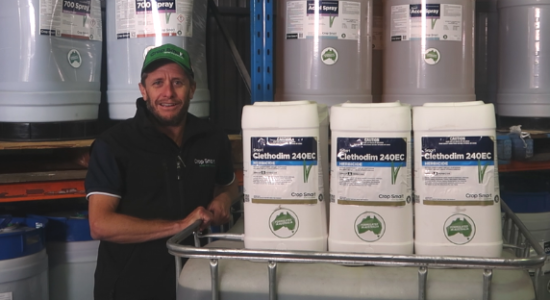
April Agronomy Update 2025
Phosphorus, Zinc and kelp
Herbicides are essential tools for weed control. However, residues from certain herbicides—particularly those with longer soil persistence—can cause unintended stress on subsequent crops. We have experienced reduced rainfall in many regions over the last 12 months. This may have an impact on herbicide breakdown in the soil.
This stress caused by herbicide residues may show up as stunted growth, chlorosis, and poor root development.
One of the most effective, yet often overlooked, ways to help crops recover from or resist such stress is through adequate and balanced crop nutrition. Three of the compounds that can help in this situation are phosphorus, Zinc and Kelp.
Phosphorus (P): A Key Nutrient for Stress Recovery
Phosphorus is essential for crop growth because it drives early root development, fast establishment, and supports energy production needed for yield and grain quality.
Phosphorus availability to crops is enhanced in warm moist soil. Healthy, vigorous roots is another way to help your crop access more P.
If you are considering lowering P rates this year to save on inputs, ensure you are sowing into a warm moist soil and have some of the applied P with the seed rather than it all below the seed. If the soil is cold, you should reconsider lower P rates.
Zinc: A Key Nutrient for Stress Recovery
Zinc is an essential micronutrient involved in numerous plant functions, many of which are directly impacted by herbicide residues. In particular:
- Enzyme Activation: Zinc is crucial for detoxification processes within plant cells. It helps support the plant’s natural ability to break down and neutralise herbicide residues.
- Growth Hormone Regulation: Zinc plays a key role in the synthesis of auxins, which are plant hormones that promote cell elongation and root development. This is especially important when herbicide stress inhibits early root growth or emergence.
- Improved Root Function: A healthy root system is essential for nutrient uptake. Zinc supports root membrane integrity and function, helping stressed crops continue to absorb the nutrients they need to survive and grow.
- Enhanced Disease Resistance: Zinc can improve the crop’s natural resistance to secondary stresses, such as diseases that may take advantage of weakened plants.
Australian soils, particularly in alkaline or sandy regions, are often low in plant-available zinc. In these conditions, the impact of herbicide residues can be more severe, making zinc even more critical.
The Added Benefits of Kelp Extracts
Kelp-based bio stimulants are gaining popularity as a natural way to support crops under stress. Derived from seaweed, kelp products offer several benefits:
- Natural Hormone Boost: Kelp is rich in natural plant hormones. These compounds can promote cell division, shoot growth, and root development—helping crops bounce back after chemical stress.
- Quality Kelp based products can also enhance root nutrient uptake and stress mitigation by improving root function and microbial activity in the root zone.
Practical Use in the Paddock
To support crops showing signs of herbicide stress before you see it:
- Plan well with good Agronomy and timing.
- Ensure adequate phosphorus supply and availability.
- Apply zinc in a readily available form—such as zinc chelates or sulphates—on the seed or in furrow. A follow up foliar spray may also be required.
- Use kelp-based seed treatments to promote root development and stress tolerance.
- Pair nutrition strategies with sound agronomy, excellent quality seed and optimum time of sowing to prevent future issues.
Conclusion
Talk to Crop Smart today about Seed Razor. This seed treatment has was developed to support the recommendations discussed in this article. It can also be applied as a foliar fertiliser. Note: Please adhere to the herbicide labels for recommended plant back and re-cropping intervals.








